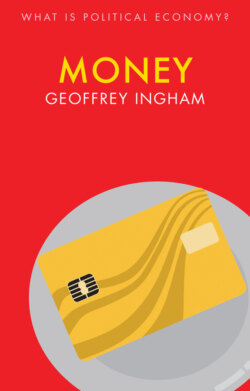Money

Реклама. ООО «ЛитРес», ИНН: 7719571260.
Оглавление
Geoffrey Ingham. Money
CONTENTS
Guide
Pages
What is Political Economy? series
Money. Ideology, History, Politics
1 Money’s Puzzles
2 The ‘Incompatibles’: Commodity and Credit Theories
Commodity Theory and ‘Metallism’
The Essentials of ‘Classical’ Theory: ‘Neutral’ Money and ‘Real’ Value
Coming to Terms with Modern Capitalist Money
Commodity-Exchange Theory: History and Logic
Credit and State Theories of Money
Nominalism and Credit Money
‘Imaginary Money’ and Promises to Pay
Money: ‘Real’ or ‘Imaginary’?
The State Theory of Money
‘A Steadfast Refusal to Face Facts’?
Conclusion
3 A Social Theory of Money and Monetary Systems
Money: Disorder and Disintegration
Deflation
Inflation
A Social Theory of Monetary (Dis)Order
Disintegration: Weimar Germany’s Hyperinflation, 1921–3
4 The Evolution of Capitalist Money
The ‘Template’ for Modern Money: the Fusion of Public and Private
The ‘Memorable Alliance’
‘The Barbarous Relic’
Modern Money: War and Democracy
The Post-1945 Domestic and International Monetary Order
A New ‘Alliance’ and the Long Post-War Economic Boom
The Disintegration of the ‘Golden Age’
Revising the Terms of the ‘Memorable Alliance’
Global Capital, Independent Central Banks, and Monetary Policy
5 Modern Money (i): States, Central Banks, and Their Banking System
‘Top’ Sovereign Money
Central Banks
The State’s Banker
The Pursuit of Stable Money
‘Lender of Last Resort’: Rescuing Capitalism and Finance-Capitalists
The Anomalous Euro
Conclusion
6 Modern Money (ii): ‘Near’ Money; ‘Complementary’, ‘Alternative’, and ‘Surrogate’ Money; and ‘Crypto-Currency’
‘Near Money’
‘Complementary’, ‘Alternative’, and ‘Surrogate’ Money
Complementary Currency
Crypto-Currencies
Conclusion
7 The Great Financial Crisis and the Question of Money
Controlling the Money-Creating Bank Franchise
Central Banks: ‘Unelected’ Power
Democratic or Socialist Money?
8 Conclusions
Further Reading
References
Index. A
B
C
D
E
F
G
H
I
J
K
L
M
N
O
P
Q
R
S
T
U
V
W
POLITY END USER LICENSE AGREEMENT
Отрывок из книги
Bruce Pietrykowski, Work
Suzanne J. Konzelmann, Austerity
.....
Despite monetary authorities’ many obvious practical and technical problems in conducting ‘monetary policy’ – essentially, attempting to control inflation – the long-run neutrality of money remains a core assumption of most mainstream economics. To believe otherwise – that money can be used as an independent creative force – is to suffer from the ‘money illusion’. As we shall see, the ‘illusion’ is to think that money has powers beyond its function as a simple instrument that only measures existing value and enables economic exchange. However, the centuries-old persistence and intensity of the unresolved disputes tells us that money is not merely this technical device to be managed by economic experts. Rather, it is also a source of social power to get things done (‘infrastructural power’) and to control people (‘despotic power’) (Ingham, 2004, 4). The ‘money question’ lies at the centre of all political struggles about the kind of society we want and how it might be achieved.
In the late nineteenth and early twentieth centuries, the longstanding intellectual, ideological, and political debates on money became embroiled in an acrimonious academic dispute about the most appropriate methods for the study of society, which ultimately led to the formation of the distinct disciplines of economics and sociology (Ingham, 2004). In 1878, exasperated by the endless wrangling, American economist Francis Amasa Walker decided on a deceptively simple solution (see Schumpeter, 1994 [1954], 1086): ‘money is what money does’, which he described in terms of four functions:
.....